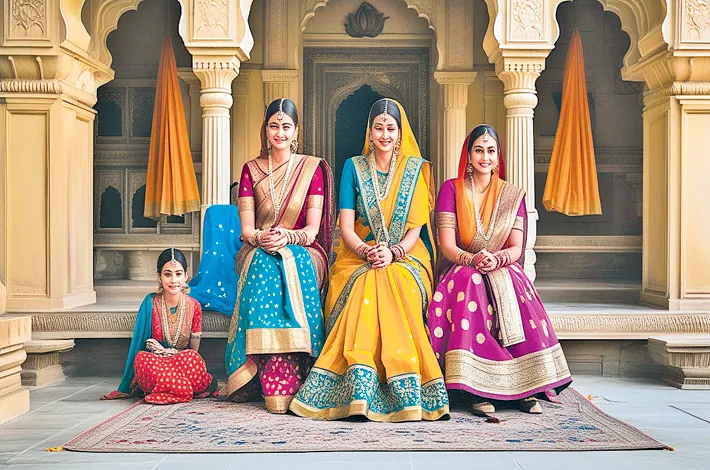The Essence of Dignity and Grace: Upholding Cultural Values for Young Indian Married Women
05-02-2025 12:00:00 AM

Indian culture, diverse yet unified in many ways, has always placed women at the heart of family and social structures. From the Vedas to modern times, the depiction of women like Sita, Draupadi, and Parvati in ancient texts has set a precedent for women embodying dignity, resilience, and grace
In the vibrant mosaic of Indian society, where tradition and modernity intersect, the role of young married women is both revered and pivotal. India, with its rich tapestry of culture, has long celebrated the virtues of dignity and grace, particularly among its women. This article explores why maintaining these qualities remains essential for young Indian married women today, intertwining these values with the well-laid ethics of Indian culture.
The Cultural Backdrop
Indian culture, diverse yet unified in many ways, has always placed women at the heart of family and social structures. From the Vedas to modern times, the depiction of women like Sita, Draupadi, and Parvati in ancient texts has set a precedent for women embodying dignity, resilience, and grace. These attributes are not just for individual betterment but are seen as contributions to the moral fabric of society.
Dignity in Daily Life
Dignity for young married women in India is about maintaining one's self-respect and the respect of others. It involves:
Respect for Self and Others: Dignity starts with self-respect, which translates into how one conducts oneself in public and private. It's about respecting one's own boundaries while also honoring the dignity of others, be it in-laws, husband, or children.
Modesty and Conduct: Indian culture values modesty, not as a suppression but as a voluntary choice to present oneself in a manner that aligns with cultural norms. This includes one's attire, speech, and behavior, reflecting an inner calm and strength.
Decision Making: Dignity also involves being part of the decision-making process within the family. While roles have traditionally been defined, modern interpretations encourage women to voice their opinions, fostering a dignified environment where mutual respect thrives.
Grace Under Pressure
Grace, in this context, is the ability to handle life's ups and downs with poise:
Emotional Resilience: Indian culture recognizes the pressures that come with marriage and family responsibilities. Grace is maintaining composure, kindness, and patience, even in adversity. It's about navigating through life's trials with a serene strength that inspires others.
Adaptability: Life in India can involve juggling multiple roles - from daughter-in-law to mother, professional to homemaker. Grace lies in adapting to these roles without losing one's essence or becoming overwhelmed.
Compassion and Empathy: Grace is also deeply connected to one's ability to empathize and show compassion, traits exemplified by many cultural and religious icons in Indian lore. This fosters a nurturing environment within and beyond the household.
Ethical Framework
The ethical tenets of Indian culture provide a guiding light:
Dharma (Duty): Dharma isn't just religious duty but extends to one's moral obligations in society. For married women, this means balancing personal desires with societal roles, always with dignity.
Ahimsa (Non-violence): This principle encourages non-violence in thought, word, and deed, promoting peace in interpersonal relations, which is crucial for maintaining grace in marital life.
Satyam (Truthfulness): Honesty in one's actions and intentions builds trust, which is fundamental to living with dignity and grace.
Modern Challenges and Responses
While the essence of these values remains timeless, modern contexts bring new challenges: Balancing Modernity with Tradition: Young women today are often at the crossroads of traditional expectations and modern freedoms. Here, dignity and grace mean integrating these aspects in a way that honors both.
Educational and Career Aspirations: With more women pursuing education and careers, dignity involves advocating for oneself while maintaining respect for family duties. Digital Age: The online world presents new arenas where dignity and grace are tested. It's about how one represents themselves and interacts in digital spaces.
Conclusion
For young Indian married women, embodying dignity and grace is not about adhering to outdated norms but about living with an awareness of one's cultural heritage while shaping it for the future. It's about creating a personal narrative where these values are not just preserved but are actively lived, ensuring that the next generation sees these virtues not as burdens but as empowering aspects of identity. In this way, dignity and grace continue to be cornerstones of a vibrant, evolving Indian culture, where every woman can thrive with respect, autonomy, and poise.








